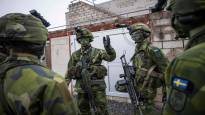According to Joel Linnainmäki, a researcher at the Foreign Policy Institute, Sweden’s NATO membership will strengthen Nordic cooperation and strengthen NATO’s defense technology expertise.
Sweden became NATO’s 32nd member on Thursday, when the Swedish Prime Minister Ulf Kristersson took the instrument of accession to the US Secretary of State in Washington.
In what way will Sweden’s position change politically and Nordically with NATO membership?
Researcher at the Foreign Policy Institute Joel Linnainmäki highlights NATO’s defense planning in ‘s morning.
– For the first time, NATO can plan the defense of the entire Nordic region as a single entity. The Nordic countries also know with certainty that if something happens in this region, they can count on each other’s support, Linnainmäki sums up.
CEO of defense technology company Saab Finland Anders Gardberg emphasizes the political significance of Sweden’s NATO membership in the history of Sweden and the Nordic countries.
– Sweden’s more than 200 years of neutrality has ended. For the first time in 500 years, all the Nordic countries are also in the same alliance, says Gardberg.
What does Sweden bring to the NATO table?
When Joel Linnainmäki is asked how Sweden’s defense technological know-how compares to other NATO countries, he thinks it is at a high level.
– Sweden brings a high level of expertise in terms of the air force. They have about 100 Gripen fighters. They are a Swedish product, Linnainmäki states.
He also highlights Swedish submarines.
– They are excellent for controlling the Baltic Sea. They can also be used for intelligence purposes, which increases NATO’s situational picture, and on the other hand, in closing the Baltic Sea, if it is necessary, Linnainmäki sums up.
According to Anders Gardberg, in addition to the air and naval forces, NATO is also interested in the Swedes’ expertise in the field of electronic warfare.
– Very significant expertise can be found on the sensor side, for example in relation to research, he states.
Challenges in rebuilding conscription in Sweden
Sweden abolished general conscription in 2010. Since then, Sweden has started investing in its defense.
According to Joel Linnainmäki, the decline in conscription 14 years ago is currently visible in the Swedish Defense Forces, for example, as a personnel shortage.
Anders Gardberg said that he watched the downing of the Swedish Defense Forces while working as a defense representative in Stockholm.
In his opinion, it has caused great difficulties in the reconstruction of conscription, because the history and knowledge of Swedish conscription was broken with the downfall.
– Now we sometimes wonder how this is actually done, Gardberg states.
Gardberg has suggested that the Swedes come to observe how the Finnish military service is going.
Watch the entire interview from ‘s morning:
